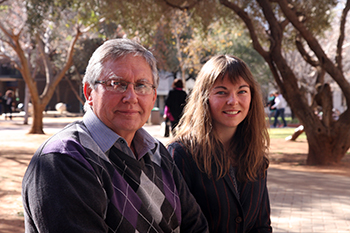
Prof Danie Vermeulen, Dean of the Faculty of Natural
and Agricultural Sciences, and Josepha Zielke, a
PhD student at the Institute for Groundwater studies at the
University of the Free State.
Photo: Leonie Bolleurs
Josepha Zielke, a PhD student at the Institute for Groundwater Studies at the University of the Free State (UFS), received the prize for the best student presentation at the International Mine Water Association (IMWA) symposium in Leipzig, Germany, this year. Her paper was titled Fine Ash Leaching in Tailings Dams – An Impact on the Underlying Aquifers?
Zielke said: “It is an honour to receive this prize as a student. IMWA is a big association which allows you to establish a network with other scientists, to exchange opinions and ideas and to gain new inspiration for your own work. It was exciting and informative to hear about the research conducted around the world and to meet the researchers themselves.”
Born in Germany, Zielke always wanted to study overseas. During an exchange year in Grade 11, she visited South Africa. When she had to make a decision about in which country to complete her studies, South Africa was first choice as she was familiar with the people and the country.
Zielke joins leading institute on groundwater research in the country
She completed her BSc Hons in Geology at the Nelson Mandela Metropolitan University. After working for a year in exploration, she decided to focus her studies on water-related problems which has been a growing issue, not only in South Africa, but in many places around the world. Zielke heard that the UFS Institute for Groundwater Studies was the leading institute on groundwater research in the country, and decided to join the university.
After completing her MSc research, An analysis of the geochemical weathering profile within a fine ash tailings dam, Mpumalanga, South Africa, Zielke started the research for her PhD project on groundwater pollution along a fault system in Mpumalanga.
Research adding value to the environment by reducing pollution
She explains the focus of her research: “Several production plants and mine waste facilities are located on or near these geological structures which could be a possible cause of ground and surface water pollution. With the aid of geophysical ground surveys (using electromagnetics and electrical resistivity tomography), aquifer and tracer tests, we are trying to determine where the pollution is coming from, how far it has been distributed and to model the potential risks.
“This research will add value to the environment by preventing or at least reducing pollution leaking into the environment. Industrial sites always have a negative footprint on the environment but at least we try and contain it by finding the cause of ground and surface water pollution. Thereafter we try and solve the pollution problem or at least mitigate the damage to prevent the spreading of ground and surface water pollution in the area.”